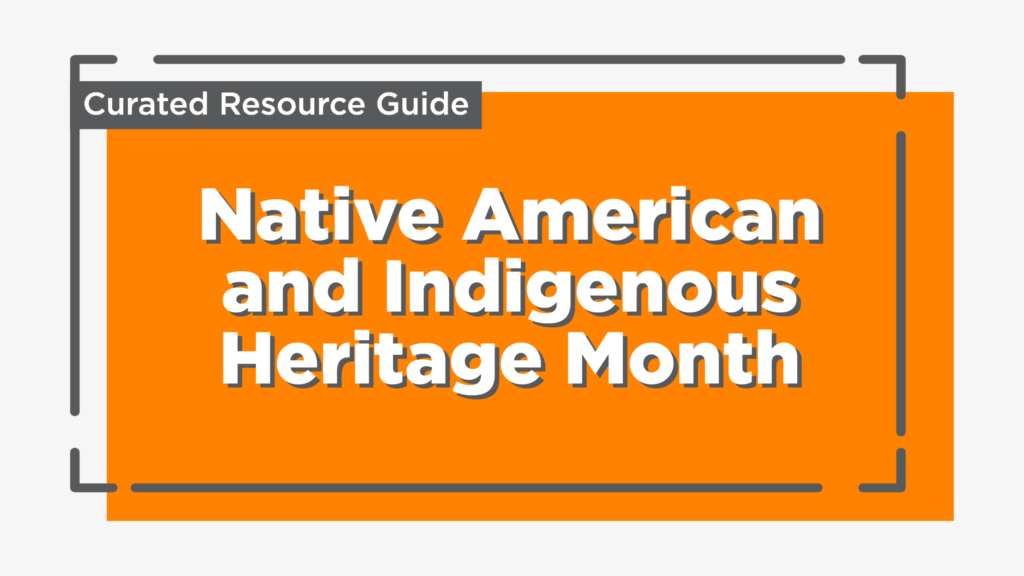November is Native American and Indigenous Heritage Month (also known as American Indian and Alaska Native Heritage Month). This month-long celebration highlights the rich cultures, traditions, heritages, and histories of Native people. While President George H. W. Bush officially approved the designation of this heritage month in 1990, others began the work towards national recognition in the early 1900s.
- Dr. Arthur C. Parker (Seneca, Onödowáʼga, “Great Hill People”) who persuaded the Boy Scouts of America to honor a day for “First Americans.”
- Rev. Sherman Coolidge (Arapaho, Hinono’ei), president of the American Indian Association, issued a proclamation on September 18, 1915 to declare the second Saturday of May as American Indian Day.
- New York became the first state to declare an American Indian Day in May 1916.
To recognize and celebrate this month, CEHHS curated a list of resources centering Indigenous/Native voices and stories. These resources are available through the UT Library and online.
- Crooked Hallelujah | Physical Book – Kelli Jo Ford (Cherokee Nation of Oklahoma)
- Family, Fortune, and the Fight for Osage Headrights | Podcast – Richard J. Longsinger (Ponca)
- OpenLine Nashville – Native American Heritage Month 2023 | Videos – Albert Bender (Cherokee)
Part 1 | Part 2 | Part 3 | Part 4 - We Are the Land: A History of Native California | E-Book – Damon B. Adkins & William J. Baurer, Jr. (Walkachi & Concow)
- Why We Serve | Multimedia
2022 Highlighted Resources
- Ancestors Know Who We Are | Virtual Exhibit
- Braiding Sweetgrass: Indigenous Wisdom, Scientific Knowledge and the Teachings of Plants | Physical Book – Robin Wall Kimmerer (Potawatomi Nation)
- Indian Cities: Histories of Indigenous Urbanization | E-Book – Native and Non-Native Authors
- More Than Personal Communication: Templates for Citing Indigenous Elders and Knowledge Keepers | Journal Article – Lorisia MacLeod (James Smith Cree Nation)
- The Experiment Podcast: Should We Return National Parks to Native Americans? | Podcast Episode – Guest Host: David Treuer (Ojibwe)
Land Recognition
Below, you will find information on the two Indigenous tribes native to the land where the University of Tennessee, Knoxville now resides using the Native Land Digital map.
Part of the Indigenous Peoples of the Southeastern Woodlands, the homelands of the ᏣᎳᎫᏪᏘᏱ Tsalaguwetiyi (Cherokee, East) include land in now Tennessee, Kentucky, Virginia, West Virginia, North Carolina, South Carolina, Georgia, and Alabama.
After the forcible relocation in the 1830s by the Indian Removal Act, many in this nation moved west into Oklahoma. Today, the federal government recognizes three Cherokee tribes: United Keetoowah Band of Cherokee Indians (Oklahoma); Cherokee Nation (Oklahoma); and the Eastern Band of Cherokee Indians (North Carolina).
The S’atsoyaha (Yuchi) lived in the eastern Tennessee River valley in the 16th century, moving to now Alabama, Georgia, and South Carolina in the late 17th century near the Muscogee Creek people.
After the forcible relocation in the 1830s by the Indian Removal Act, many in this nation moved west into Oklahoma. Today, many Yuchi people make community with the federally recognized Muscogee (Creek) Nation, but maintain a distinct cultural identity especially through the Yuchi language.
Indigenous and Native Voices
The below resources highlight some of the voices in the Indigenous/Native community through different media formats. Bolded resources signify those written/created by Native and Indigenous peoples.
“All the Real Indians Died Off” and 20 Other Myths about Native Americans | Physical Book – Roxanne Dunbar-Ortiz & Dina Gilio-Whitaker (Colville Confederated Tribes)
An Indigenous Peoples’ History of the United States | Physical Book – Roxanne Dunbar-Ortiz
Everything You Wanted to Know About Indians But Were Afraid to Ask | E-Book – Anton Treuer (Ojibwe)
Like a Loaded Weapon: The Rehnquist Court, Indian Rights, and the History of Racism in America | Physical Book – Robert A. Williams (Lumbee)
An American Sunrise | Poetry – Joy Harjo (Muscogee Creek)
Bad Indians: A Tribal Memoir | Memoir – Deborah Miranda (Ohlone-Costanoan Esselen Nation)
Cherokee Thoughts: Honest and Uncensored | Essays – Robert Conley (Cherokee)
Heart Berries | Memoir – Terese Marie Mailhot (First Nations)
Woven Stone | Poetry – Simon J. Ortiz (Acoma Kerese Pueblo)
Día de los Muertos | Curated Video List
Lake of Betrayal | Documentary
We Shall Remain | Documentary
Americans | Virtual Exhibit
Developing Stories: Native Photographers in the Field | Virtual Exhibit
Native American Spaces: Cartographic Resources at the Library of Congress | Research Guide
Zinn Education Project | Educational Resource
Sabrina & Corina by Kali Fajardo-Anstine (Indigenous Latina)
Shell Shaker by Leanne Howe (Choctaw)
The Marrow Thieves by Cherie Dimaline (Métis Nation)
The Only Good Indians by Stephen Graham Jones (Blackfeet)
The Removed by Brandon Hobson (Cherokee)
All My Relations – Matika Wilbur (Swinomish & Tulalip) and Adrienne Keene (Cherokee)
This Land – Rebecca Nagle (Cherokee)
Toasted Sister Podcast – Andi Murphy (Navajo)
Vanished: A Native American Epidemic – KHQ-TV
Updated November 2023 by Miranda N. Rutan, Doctoral Student, CEHHS DEI, UT Knoxville | Curated November 2021 by Miranda N. Rutan, Doctoral Student, CEHHS DEI, UT Knoxville
